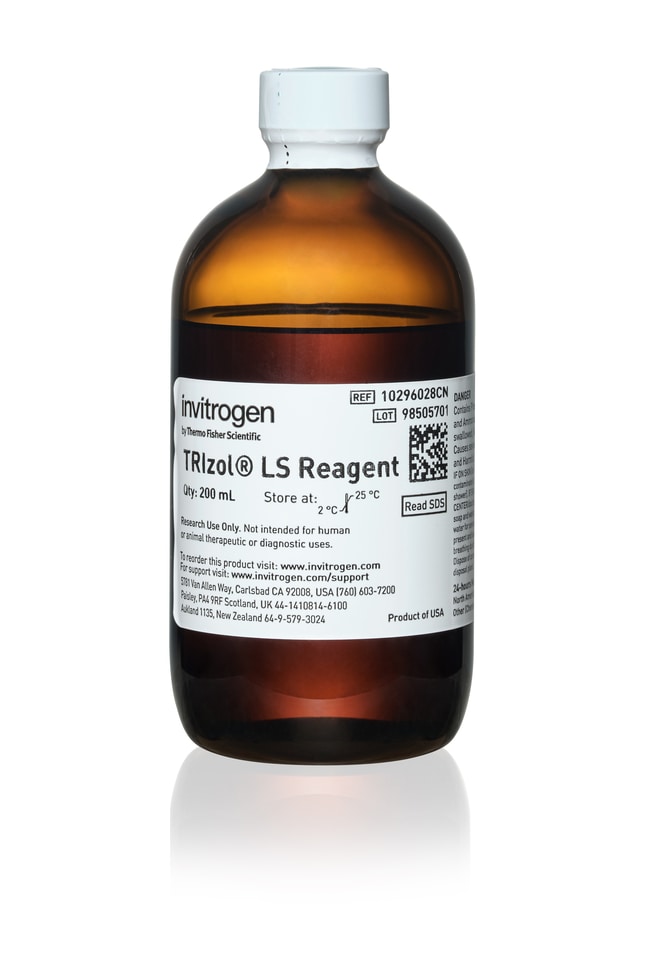Search Thermo Fisher Scientific
- Contact Us
- Quick Order
-
Don't have an account ? Create Account
Search Thermo Fisher Scientific

| Catalog Number | Volume (Metric) |
|---|---|
| 10296028CN | 200 mL |
| 10296010CN | 100 mL |
TRIzol LS Reagent is a complete, ready-to-use reagent optimized for the isolation of high-quality total RNA, or the simultaneous isolation of RNA, DNA, and protein from a variety of liquid samples. This monophasic solution of phenol and guanidine isothiocyanate is designed to isolate separate fractions of RNA, DNA, and proteins from liquid samples of human, animal, plant, yeast, bacterial, and viral origin, typically within one hour. Key features of TRIzol LS Reagent:
• Formulated for use with liquid samples such as serum and virus preparations
• Facilitates recovery of RNA, DNA, and protein from a single liquid sample
• Offers excellent lysis capability, even with difficult biological fluids
Reliably purify RNA from multiple sample sources
TRIzol LS Reagent is designed for processing a variety of liquid samples of up to 0.25 mL in volume. TRIzol LS Reagent differs from the standard TRIzol Reagent in concentration, which permits larger samples to be processed. Just as with the standard TRIzol Reagent, the integrity of resulting RNA preparations is maintained by the highly effective inhibition of RNase activity during sample homogenization. The simplicity of the TRIzol LS Reagent method allows simultaneous processing of a large number of samples. The entire procedure can be completed in 1 hour. Total RNA isolated by TRIzol LS Reagent is free of protein and DNA contamination.
Formulated to serve multiple isolations
TRIzol LS Reagent allows you to perform sequential precipitation of RNA, DNA, and proteins from a single sample. After homogenizing the sample with TRIzol LS Reagent, chloroform is added, and the homogenate is allowed to separate into a clear upper aqueous layer (containing RNA), an interface, and a red lower organic layer (containing the DNA and proteins). RNA is precipitated from the aqueous layer with isopropanol. DNA is precipitated from the aqueous/organic interface with ethanol. Protein is precipitated from the phenol-ethanol layer by isopropanol precipitation. The precipitated RNA, DNA, or protein is washed to remove impurities, and then resuspended for use in downstream applications.
Purified products are ideal for use with a variety of applications
Isolated RNA can be used in real-time quantitative PCR (qPCR), northern blot analysis, dot blot hybridization, poly-(A)+ selection, In vitro translation, RNase protection assays, and molecular cloning. Isolated DNA can be used in PCR, restriction enzyme digestion, and Southern blots. Isolated protein can be used for western blots, recovery of some enzymatic activity, and some immunoprecipitation